Newspapers 2.0: How Web 2.0 is the Daily Express?
The Web 2.0 new media buzz-word has penetrated the mainstream media as a short-hand for all sorts of new internet-enabled technologies. I was curious to see how many of the British Press have actually themselves adopted any of the kinds of functionailty and services bracketed under the Web 2.0 "concept".
I have therefore done a survey of the main British newspaper websites, looking at the extent to which they include or promote things like RSS feeds, blogging, user-generated content and social bookmarking widgets.
I want to start by looking at the website of The Daily Express, who just a few weeks ago redesigned their very dreary previous site into something with a sparkle of 2.0ness about it. Even if the stories are still mostly about tax, the weather and Diana.
The last time I looked at the Express online in any detail, it didn't even offer a site search of archived articles. The recent redesign clearly shows there has been a significant change of new media strategy at Northern and Shell Media Publications
RSS feeds
The first thing of Web 2.0 note is that the Express now provides RSS feeds. There is a prominent orange icon and "What is RSS?" link at the header of the page.

However, they haven't gone all the way and made the site's main RSS feed auto-discoverable from the homepage - there is no <link> to their RSS feed in the <head> of the document, so users have to find it manually to sunbscribe.
There are other aspects of their RSS implementation that are slightly non-standard behaviour. On individual story pages, the RSS icons do not actually link to the feed that is relevant to that story, instead they link through to the generic "What is RSS?" page.
At the time of reviewing the site, they offered 27 categorised feeds.
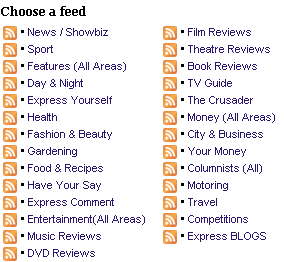
Another curious thing was that on the "What is RSS?" page they include a check-box which requires you to accept their Terms & Conditions of using the feeds before you can subscribe to them.
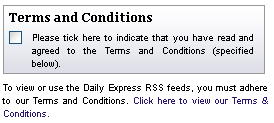
That seems a little odd to me, and they enforce the clicking of the box with a pop-up dialogue when you try to view one of the feeds. If you can actually get one of them to load, the XML features a headline and opening snippet of each story, and not the full content of the stories.
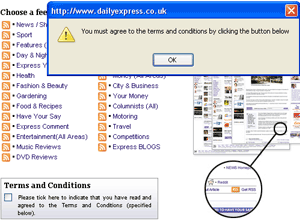
The "What is RSS" page makes a reasonable attempt at explaining the RSS concept, and also offers links through to a variety of web-based and OS-based feedreaders, although I suspect both Google and Microsoft will be displeased to see Google Reader and Internet Explorer 7 left off the list of web-based readers and browsers with RSS integration respectively.
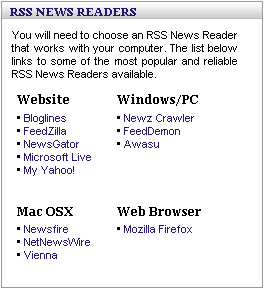
Incorporating comments
In terms of user-generated content, The Daily Express had for some time allowed readers to comment online, even if they did sometimes rather have strange calls to action - "Has Britain gone to the dogs?" being my favourite by some way. Commenting on the redesigned site seems more tightly linked to individual stories rather than linking several stories through to a similarly themed forum thread, as the site used to do. There is plenty of promotion for the comments facility at the top and bottom of articles.

The site also now has a MyEXPRESS service - although frustratingly at the time reviewing the site (March 26th) the giant skyscraper and big ad format promotions for it were not clickable, and you had to navigate your way to the service in other ways in order to be able to register.

The service is for the over 18s, and gives people their own space on the site and the ability to join in the message boards. The registration form comes pre-filled with helpful examples, which disappear as soon as you mouse into the form. On the usability downside, the date range for birth-date goes up to 2007, which doesn't make sense for an over 18s service. The default date is a sensible 1980 rather than being one extreme or the other - although I wonder if the average age of the online Daily Express reader really is as low as 26/27?
Blogs
On the blogging front it looks like The Daily Express has coerced a roster of 16 staff into undertaking blogging duties. Quite a few recent spats between papers have been about the success (or otherwise) of their blogging ventures - and I do genuinely believe that whilst you can force a journalist or editor to blog, if the tone, frequency of posting and enthusiasm to engage are not there, it will not make for compelling content.
The Daily Express blogs don't seem to have got off to a great start. Having calender style navigation ruthlessly exposes whether blogs are frequently updated or not, and when a blog from a professional journalist isn't gripping, the audience can be a cruel one. Without picking on her specifically, Catherine Boyle's reality TV blog was typical of the site, with a low post rate and even lower comment rate.
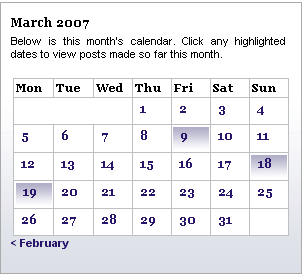

The 'blog' set-up by The Daily Express also misses a couple of vital bits of implementation. Navigation between posts can only be done by date from the right-hand navigation. There are no previous or next links on any posts. Plus, the RSS feed for the blogs is a combination of the output of all of the authors.
Quite why The Express thinks I would want to subscribe to their sport blogs posts, and also get posts about women's health and fashion is beyond me, and rather defeats the entire concept of the user choosing the content they want to receive via RSS.
Another slight oddity is that clicking on the link "See all stories by author" takes you through not to a category-style blog page, but to a search results page.
Talking of search, I mentioned earlier that The Daily Express did not used to have a site search facility. They seem to have completely reversed their policy on this, as not only do they offer site search now, but 'scoped' search boxes are now embedded in some stories.

I'm not entirely sure what to make of this, and I wonder if they will be measuring the specific use of this kind of box. I'm always happy to see search put prominently in front of the user of course, but it is almost as if they are expecting the user's attention to wander off whilst they are reading the article, and the search box is a device for trying to keep them on the site.
Social bookmarking
The last area of Web 2.0ness I wanted to look at was the inclusion of social bookmarking widgets. The Daily Express has added bookmarking buttons at the foot of story pages and blog posts, and has opted to include del.icio.us, Digg, Fark, Newsvine and Reddit, next to some more familiar Web 1.0 functions like 'email a friend', 'contact us' and 'print this page'

The site, though, doesn't seem to include any explanatory material about what the buttons are for or what they do.
Web 2.0 verdict
Overall the Daily Express is making a reasonable stab at Web 2.0ness, by incorporating RSS (if not in a completely standard fashion) and social bookmarking prominently. Their interactive MyEXPRESS service is not a world beater, but seemed quite usable, although I was rather horrified that my confirmation email featured a link to activate the account. And my username. And my password, all in the same plain text email. Aside from that security idiocy, it is only really their blogging provision that I would say was poor.
Next...
In the next part of this series, I will be looking at another newspaper that recently re-designed their online presence, The Times.